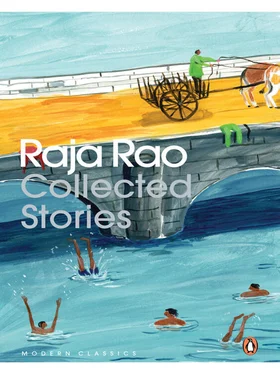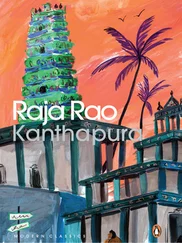Raja Rao - Collected Stories
Здесь есть возможность читать онлайн «Raja Rao - Collected Stories» весь текст электронной книги совершенно бесплатно (целиком полную версию без сокращений). В некоторых случаях можно слушать аудио, скачать через торрент в формате fb2 и присутствует краткое содержание. Год выпуска: 2014, Издательство: Penguin, Жанр: Классическая проза, на английском языке. Описание произведения, (предисловие) а так же отзывы посетителей доступны на портале библиотеки ЛибКат.
- Название:Collected Stories
- Автор:
- Издательство:Penguin
- Жанр:
- Год:2014
- ISBN:нет данных
- Рейтинг книги:5 / 5. Голосов: 1
-
Избранное:Добавить в избранное
- Отзывы:
-
Ваша оценка:
- 100
- 1
- 2
- 3
- 4
- 5
Collected Stories: краткое содержание, описание и аннотация
Предлагаем к чтению аннотацию, описание, краткое содержание или предисловие (зависит от того, что написал сам автор книги «Collected Stories»). Если вы не нашли необходимую информацию о книге — напишите в комментариях, мы постараемся отыскать её.
Collected Stories — читать онлайн бесплатно полную книгу (весь текст) целиком
Ниже представлен текст книги, разбитый по страницам. Система сохранения места последней прочитанной страницы, позволяет с удобством читать онлайн бесплатно книгу «Collected Stories», без необходимости каждый раз заново искать на чём Вы остановились. Поставьте закладку, и сможете в любой момент перейти на страницу, на которой закончили чтение.
Интервал:
Закладка:
‘But what about the shoe, you idiot,’ swore the Master’s brother, impatient.
‘It is about the shoes, Master. I had torn down the leaves. The sheep were munching and munching. The big dog that had eaten the young deer stood just near the sluice of the canal. He sat with his paws down, his ears stretched, and I knew with one jump he would fall on my sheep. I took a stone and sent it straight at him. He simply gobbled a fly on his body and would not look at me. I felt frightened. I had no more stones by me. I took my left shoe and sent it straight against his eyes. The devil rose up and wagged his tail, looking all the time at Sampanna’s fifteen-day-old lamb. I took my second shoe and sent it straight against his legs. It hit him this time, and he wailed and turned back. ‘Now he is down,’ said I, and I rushed at him, my stick lifted up. But he grabbed at one of my shoes, and ran off towards the crematorium. I ran too and not until I had sent him by the village temple did I stop. The shoe, Mother, he took it away, the same brown dog, with an ear torn off. The other — I never found it. But I’ll beat him one day, Mother. The next time I catch him I’ll give him a good skinning.’
‘Well done, my hero,’ cried the Master’s brother, who always loved to joke. Narsa felt comforted. Yes, he had done the right thing. But the Mistress again turned to him and asked:
‘Then why didn’t you come and ask me for a new pair, you fool? You shouldn’t go about among the cactus thorns, barefooted.’
‘Mother, I wanted to ask. But, you see, Mother. . I went and asked uncle Sampanna. He said he would pay me eight annas a month if I looked after his sheep. He said he would buy me sweets with it. Then, said I to him: ‘Uncle, buy me a pair of shoes instead for this pair. I have to walk barefoot, and it is summer, the sands are scorching, the stubs hard, and the goats throw thorns on every path.’ He said ‘No, a pair of shoes costs too much. Take mine. They’ll do for you.’ ‘Quite so, Uncle,’ I said, and he gave me the ones he wore. I put my feet into them and I said, ‘They are too big for me, Uncle.’ He put some clay into them, and stuffed some leaves at the back, and he said, ‘Go ahead!’ They pinched me as I walked. But I dare not ask uncle Sampanna. He is an angry man, and auntie says he is a very bad man. . ’
‘Why didn’t you come and tell me? I would have squeezed it out of his flesh,’ spat out the Master’s brother. Narsiga was embarrassed and silent.
‘Why didn’t you come to ask me for new shoes?’ the Mistress said angrily.
‘For nothing,’ he whispered, hiding his face behind his arms.
‘Speak, you monkey!’ commanded the Master’s brother.
‘Mother,’ he began, trembling, ‘I can’t say. I saw that you gave a blanket to the old Mohammedan beggar; I saw that you gave a shirt to Barber Ranga, and you give food every day to Chandrayya, and Sampanna and Rajanna and all the people who live in our huts. Mother, you give milk for Chinnamma’s child and Ramamma’s child, and I have seen you prepare woollen head-gear for them. Mother, you are so good. How can you feed all?. .’
The Master was moved. He patted him on the head and said at the next fair he would have a pair of shoes. But Narsa would not have it. Why should Master give away everything? Narsa earned eight annas from Sampanna and six annas from Rachanna. He took their sheep into the woods. And when the Master’s brother was distributing wages the following Tuesday afternoon for the weekly fair, Narsa cried out, grave and authoritative like Shop-keeper Ramachetty had done to Pariah Rachayya, who hadn’t paid his debts,
‘Hè, Sampanna. You owe me eight annas.’
Sampanna feigned not to hear.
‘ Hè, Uncle,’ cried out Narsa again, trying to let the Master’s brother hear it, ‘do you hear? You owe me eight annas.’
‘Oh, yes, yes. Another time,’ he said, and rose up to go.
‘Master, Master,’ whispered Narsa in the ear of the Master’s brother, ‘I want to buy a pair of slippers, and uncle Sampanna has my eight annas.’
The Master’s brother fumed and spat, and uncle Sampanna paid him not only eight annas, but eight and eight and eight annas — he had not paid for such a long, long time — and Narsa went to the fair the same afternoon, to buy his pair of slippers, a pie worth of Bengal gram, and he bought something else that none saw and none knew, but the next morning everybody wondered who could have stuck a paper-flower on the cradle-stand. Narsa himself wondered.
Narsa is now a big person. He can reach the Master’s waist. He now wears long jackets and big slippers, and even a cap such as the sahibs wear. ‘It protects the eyes,’ the Master said. Besides, he now knows how to read. He can read what is written on the top of tea-boxes, and trains, and once he had even tried to read the paper that the postman brings to the Master every day. Rangappa, the sullen student of the Master, gives lessons to Narsa and the other ashram boys. They sit every evening at lighting time in the verandah of the central building, and there they learn alphabets and words. And Narsa even knew a poem that was printed in the middle of the book — you know, the one about Mother Cow and the Hungry Tiger? Poor orphan calf! But what Narsa liked the most was the prayer at the end. It was so sweet. It spoke of the Mother. Mother who was good, Mother who was kind. Mother who grew rice. Mother, Mother, Mother, it ended, and Narsa always sang it closing his eyes and figuring the Master’s wife— sometimes it was only his auntie — as a huge big goddess, sitting on a swan, like the one in the picture by the sanctum door, a huge light behind her head, a conch in one hand, a wheel in another, and a tamed lion at her feet. She held rice in one hand and a lotus in the other, and it was surely the same, thought Narsa, to whom he sang. And when it came to the end, ‘Mataram, Mataram,Vande Mataram,’ Narsa’s eyes suddenly grew full of tears, and the whole earth seemed to grow soft and radiant, and he felt his head resting on the lap of a great big mother. ‘Mataram, Mataram, Vande Mataram’, he gently lisped to himself.
But he wanted to know who this Mother was. He heard the other boys in the ashram say that one should fight for the Mother. One should pray for the Mother. One should love the Mother.
‘Who is this big Mother, Sir?’ he asked one day of his teacher.
‘Mother,’ he said, ‘which Mother?’
‘The one we sing about after the classes are over.’
‘Oh! you idiot,’ swore the teacher. ‘Why don’t you know even that much, you buffalo? It is our country, our Motherland.’
‘What is our country, Sir?’
‘Country! Country is the one we live in. This is our country.’
‘But it is ours,’ Narsa said.
‘No, no,’ cried the teacher. ‘The country is big, a million million times as big as this ashram. But it is no more ours. The Red-man rules us. He takes away all our gold, and all our food, and he allows the peasants to starve and the children to die milkless. He has put the Mother into prison. But, my son, you must not hate him. He is not a bad man. But there is a devil in him, a monster and a devil in him. The devil haunts him. And one day when we shall have driven him out of the country, we shall be happy and beautiful and our Mother will rejoice in her freedom.’
‘Master, is the Red-man the same who comes hunting in the woods, with big huge, white hats, and faces like the monkeys? But, Sir, they are bad men. Bad men. What do you think, Sir, last year when I took the sheep into the woods, one of them, one of these Red-men, put up a little tent by the big bridge of the river. He had one servant, two servants, and three servants. They all went behind him. And they had dogs too. I knew they went in search of deer. Poor things! So I used to sit behind the huge pipal by Saint Rahman Khan’s tomb, and cry ‘Ooo, OOOO’ like a deer. The dogs came running. And the men followed. They caught me and beat me. Sir, they are bad men — the Red-men. I saw them beat Left-handed Rachanna too, for he had sworn at them. They had walked across the fields hunting a crane. Bad men, Sir, very bad men. And the Mother is caught by them. And they beat her. Sir, I too will also fight against them. Tell me, Sir, how can I fight against them?’
Читать дальшеИнтервал:
Закладка:
Похожие книги на «Collected Stories»
Представляем Вашему вниманию похожие книги на «Collected Stories» списком для выбора. Мы отобрали схожую по названию и смыслу литературу в надежде предоставить читателям больше вариантов отыскать новые, интересные, ещё непрочитанные произведения.
Обсуждение, отзывы о книге «Collected Stories» и просто собственные мнения читателей. Оставьте ваши комментарии, напишите, что Вы думаете о произведении, его смысле или главных героях. Укажите что конкретно понравилось, а что нет, и почему Вы так считаете.












